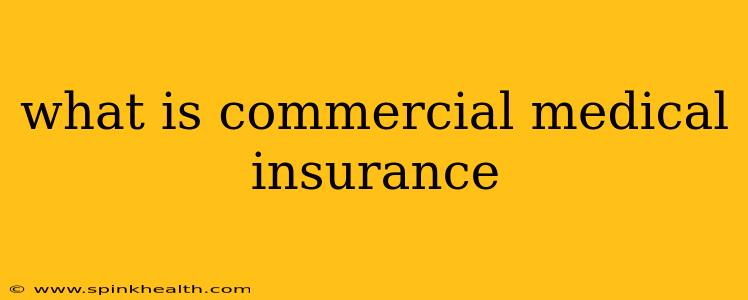What is Commercial Medical Insurance? A Deep Dive into Private Healthcare Coverage
Imagine this: You’re enjoying a sunny afternoon when, suddenly, you twist your ankle. A trip to the doctor, followed by physical therapy, leaves you with a hefty bill. This is where commercial medical insurance steps in – it's the safety net many rely on to manage the often unpredictable and expensive costs of healthcare. But what exactly is it?
Commercial medical insurance is a type of health insurance provided by private companies, as opposed to government-sponsored programs like Medicare or Medicaid. These companies offer various plans, each with its own set of rules and coverage details. Think of it as a contract: you pay premiums (regular payments) to the insurance company, and in return, they agree to cover a portion of your medical expenses. This coverage can range from doctor visits and hospital stays to prescription drugs and mental health services.
The beauty of commercial insurance lies in its diverse options. Unlike government programs, commercial plans offer a wide variety of choices, allowing you to tailor your coverage to your specific needs and budget. This means you might have more flexibility in choosing your doctors and hospitals, which can be a significant factor in your overall healthcare experience.
How Does Commercial Medical Insurance Work?
Commercial medical insurance typically works through a system of deductibles, co-pays, and coinsurance. Let's break these down:
-
Deductible: This is the amount you have to pay out-of-pocket for healthcare services before your insurance company starts covering expenses. Think of it as your initial investment before the insurance kicks in.
-
Co-pay: A fixed amount you pay each time you visit a doctor or receive certain services, regardless of the total cost.
-
Coinsurance: This is the percentage of the costs you pay after you've met your deductible. For example, if your coinsurance is 20%, you'll pay 20% of the bill, and your insurance company will pay the remaining 80%.
What are the different types of Commercial Medical Insurance?
The world of commercial medical insurance isn't one-size-fits-all. Several common types exist, each with its nuances:
-
HMO (Health Maintenance Organization): HMO plans typically require you to choose a primary care physician (PCP) who acts as your gatekeeper to specialists. You generally only receive coverage for care within the HMO's network of doctors and hospitals.
-
PPO (Preferred Provider Organization): PPO plans offer more flexibility. You can see specialists without a referral from your PCP, and you often have coverage for out-of-network care, though at a higher cost.
-
EPO (Exclusive Provider Organization): Similar to HMOs, EPO plans require you to choose a PCP and see doctors within the network. However, unlike HMOs, they typically don't offer coverage for out-of-network care.
-
POS (Point of Service): POS plans blend elements of HMOs and PPOs, giving you some flexibility while still requiring a PCP.
Who Offers Commercial Medical Insurance?
A vast landscape of private companies provides commercial medical insurance. These include large national insurers, regional companies, and smaller, specialized providers. Many employers offer commercial insurance plans as part of their employee benefits packages, while others can purchase plans directly from insurers on the individual market.
What are the advantages and disadvantages of commercial medical insurance?
Advantages:
- Wide range of choices: A variety of plans cater to different needs and budgets.
- Flexibility: Often more flexibility in choosing doctors and hospitals.
- Comprehensive coverage: Plans can cover a wide range of medical services.
Disadvantages:
- Higher premiums: Premiums can be expensive, particularly for individual plans.
- Out-of-pocket costs: Deductibles, co-pays, and coinsurance can still result in significant out-of-pocket expenses.
- Network limitations: Some plans restrict access to specific doctors and hospitals.
How do I choose the right commercial medical insurance plan?
Selecting the right commercial medical insurance plan requires careful consideration of your individual needs and budget. Factors to consider include:
- Your health status: If you have pre-existing conditions, you'll need a plan that covers them.
- Your budget: Consider the premiums, deductibles, co-pays, and coinsurance.
- Your healthcare needs: Think about the type of medical care you anticipate needing.
- Your doctor preferences: Check if your preferred doctors are in the plan's network.
Choosing the right commercial medical insurance plan is a crucial decision that directly impacts your financial well-being and access to healthcare. Take your time, do your research, and don't hesitate to ask questions. Remember, understanding your options is the first step to securing the best possible coverage for yourself and your family.

